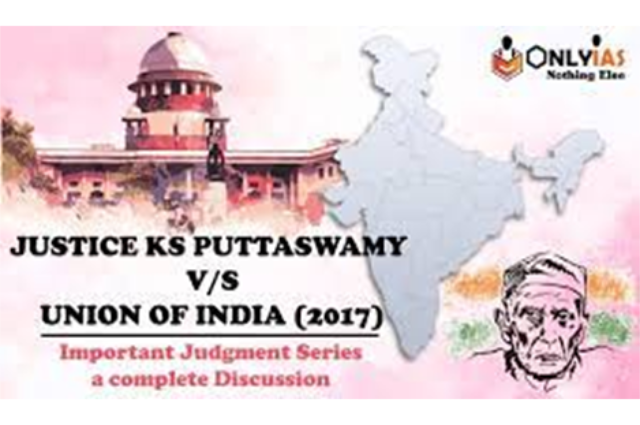
INTRODUCTION
Justice K. S. Puttaswamy (Pr.) and Anr. Vs Union Of India is a landmark case and decision delivered by the Supreme Court of India. The court's decision gives a new look at the privacy rights of citizens. Privacy has been considered a fundamental right under Articles 14, 19, and 21 of the Constitution of India. This event is one of the lengthiest cases in India. The popular case is also commonly referred to as the Aadhar case, Privacy case, or K. Puttaswamy Judgement. Two benches were constituted to solve the problem of bifurcating the case.

FACTS
- Former Karnataka High Court Judge, K.S.Puttaswamy filed a PIL in 2012 against Union Of India.
- The Aadhar Scheme was challenged saying it violates the fundamental Right to Privacy and Equality.
- According to him, collecting biometric data by Government Agencies without proper Legislation is a breach of privacy.
- Due to this conflicting decision, there has been a lot of confusion about whether Indian citizens have right to privacy or not?
- On the other hand, the government has started linking Aadhaar to many things and made it mandatory.
- People fear that personal biometric data collected by the government will be stored in a central server and that if leaked, it will be easier to use.
- Before this, the police must issue warrants and follow security protocols. However, the current situation is that the government can access data, location, and conversion with one click.
ISSUES
- Whether the Aadhar Act is Constitutionally valid or not?
- Whether the Right To Privacy is fundamental Right or not?
LAW
The RIGHT TO PRIVACY is a fundamental right. It is a right that protects an individual's inner environment from interference by state and non-state actors and allows individuals to make independent life choices.
The court held that privacy is an integral part of the freedom guaranteed by fundamental rights and is an essential aspect of dignity, autonomy, and freedom.
ANALYSIS
In the case validity of Aadhar Act (5 bench Judge) Aadhar Act (5-Judge) Justice KS Puttaswamy, in his dissent, said that the government has collected and stored all vital data on a central server but has no security measures in place to protect it. Any private institution can easily access this information for identification purposes. Moreover, the use of this information by the government is not regulated and the government welfare scheme is a fundamental right of the citizens and therefore cannot be withheld for any reason. On September 26, 2018, the Aadhar Act was enacted in the Constitution and the provision of biometric data is not a violation of fundamental rights. However, several problematic sections of the Aadhar Act are considered unconstitutional, including Section 57, Section 33 (1) (2), Section 47, and Section 2d.
Is the Right to Privacy a Fundamental (9 bench Judge) decision made in the cases of M.P.Sharma as well as Kharak? Singh was overruled. Also, the foundation of the right to privacy can be found in Article. 14,19,20,21 and 25 of the Indian Constitution and there are many international conventions that consider privacy as an important fundamental right.
CONCLUSION
The Supreme Court of India heard both sides and ruled that the right to privacy in K.S. Puttaswamy (Retired) & Anr. of India and Ors. The case of Navtej Singh Johar vs Union of India was also decided based on this judgment which held Section 377 IPC unconstitutional. The court rejected the possibility of private organizations using authentication mechanisms or asking citizens for Aadhaar details to protect privacy. The move by the court is to protect the privacy of citizens and show that privacy is indeed a fundamental right.
REFERENCE
- AIR 2018 SC (SUPP) 1841.
